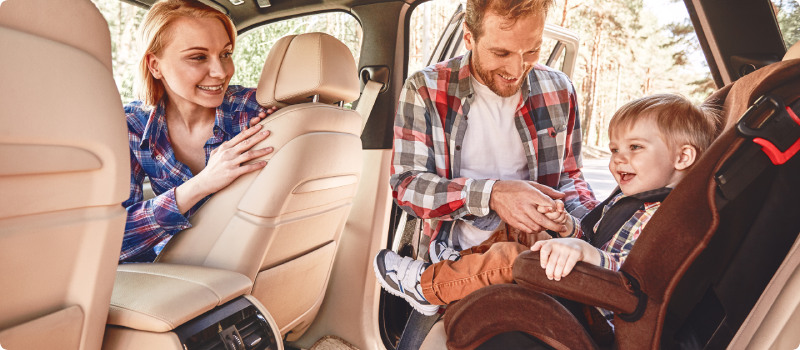About About Airbags
Updated April 23, 2024 . AmFam Team
Car shopping for that perfect ride? It’s a good idea to take airbags into consideration, too. Airbags and seatbelts have allowed thousands of passengers to walk away from serious accidents with only minor injuries — or less — because of the protection they provide.
Here’s everything you need to know about airbags and how they can keep you and your family safe on the road.
What are airbags?
Airbags are car safety devices designed to protect you in the event of a crash. They are thin, nylon fabric bags that unfold from different locations in your car. Airbags are supplemental protection and are meant to keep you safe in your car alongside your seatbelt.
How do airbags work?
If you get in a car accident, airbags work by inflating when a sensor connected to your vehicle’s airbag detects a collision. They are inflated by nitrogen gas and will deflate as soon as the driver or passengers make contact with the airbag. The airbag acts as a cushion between you and your car to mitigate injuries you may sustain during a crash.
How fast do airbags deploy?
It takes an airbag less than 1/20th of a second to inflate. CarsDirect estimates that airbags deploy at speeds between 100 to 220 miles per hour. Because they deploy so quickly, airbags can be very dangerous if you are not wearing your seatbelt.
Where are car airbags located?
Typically, there are multiple airbags in your vehicle that are located in different areas. Here are the different types of airbags and where they deploy from.
Frontal airbags: Located in the steering wheel for the driver and in the instrument panel for the front passenger
Knee airbags: Deploy from beneath the steering column to protect the driver’s and front passenger's knees
Side airbags: Located in the vehicle’s doors to protect from side collisions
Curtain airbags: These deploy downwards from the vehicle’s roof to protect your head
Airbags and Your Kids
Due to how fast they deploy, airbags can be very dangerous — especially to children. Here are safety considerations when driving with infants or children.
Airbag Safety for Infants
Never put a rear-facing infant car seat in the front seat. It may be too close to the inflating airbag and its force, which can be transmitted through an infant seat. The rear seat is the safest place in the car for a child or an infant. Make sure they are secured in an infant-only or convertible child car seat while sitting in the rear seat.

Airbag Safety for Children
Older children should always wear lap and shoulder belts, so they’re not seriously injured by the force of a deploying airbag. Properly fasten your children in car safety seats or belt-positioning booster seats. Have the lap and shoulder belts corrected for their size.
Like infants, the back (rear) seat is the safest place for children 12 and under.
If a child must ride in the front, move the seat back as far as possible away from the airbag. Be sure the child is restrained properly for his or her size. Keep in mind that your child may still be at risk of injuries from the airbag.
Airbag Recalls
Sometimes airbag manufacturers recall airbags if they’ve been found to be faulty. For example, airbags are recalled if they might explode when deployed. When shopping for cars, ask your dealer about the vehicle’s airbags and whether there is currently a recall. Learn more about auto recalls and what to do if your car is affected.
But First, Buckle Up
Even with airbags, it’s still important for everyone in your car to buckle up. According to the CDC (Opens in a new tab), seatbelts are one of the most effective ways to save lives and reduce injuries in crashes for adults and older children. Seatbelts keep people in the car and in position so the airbag can do its job — cushion your impact.
Stay Protected with Car Insurance
Now that you have the facts about airbags, you're all set to make sure your car is equipped and ready to keep you safe. While you're reviewing the safety of your car, be sure that you're protected with the right car insurance coverage for your needs.
Reach out to an insurance agent to discuss your options and consider additional insurance like collision coverage to keep you and your family safe.
Car Maintenance Hub
Now that you’ve got the know-how down for airbags, it’s a great time to understand the ins and outs of the rest of your car! From jumping a car to changing a tire, we have everything you need to keep your car in tip-top shape.
This article is for informational purposes only and includes information widely available through different sources.

